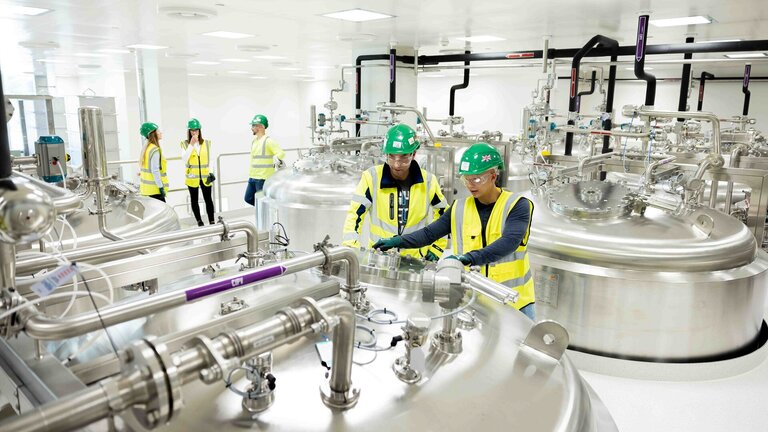Ulm, Germany, July 11, 2023. It is a project of superlatives: Ratiopharm's parent company Teva is investing around one billion US dollars in biotechnological production at its Ulm site. Starting in 2025, biopharmaceuticals will be produced in giant bioreactors in the Danube Valley near Ulm. These drugs are used for treating complex, sometimes life-threatening diseases, such as cancer or tumor illnesses, or for pain patients. Drees & Sommer, a company which specializes in construction and real estate consulting, supports Teva during the demanding building and commissioning phases.
From the outside, the building with the project name Genesis already looks nearly finished. Inside, however, the final preparatory work is going at full speed to inspect and commission the production facilities and train the employees. It also becomes clear very quickly why planning and construction are so challenging. ‘The production of biopharmaceuticals is highly complex and technologically demanding,’ explains Stefan Fügenschuh, who heads Teva Deutschland‘s biotechnology division. This has nothing to do with simple tablet presses, because the production of biopharmaceutical medicines is fundamentally different from the manufacture of pharmaceutical drugs.
Biopharmaceuticals are drugs manufactured with biotechnological techniques, using living cells or organisms for their production.
The Building’s Heart Beats in the Media Duct
‘Everything is perfectly coordinated in the new production plant, and the entire building is almost completely digitized and automated,’ says Bernd Hägele, Vice President Global Engineering Business Partner at Teva. Genesisthus serves as a forerunner and blueprint for the next stage of automation at Teva. More than 26,000 measuring instruments monitor the operation extremely precisely, while a total of 16 kilometers of stainless-steel pipes and around 300 kilometers of cables run through the eight floors of the building. The main media supply system is located in a central technology duct that runs throughout all floors of Genesis like a ‘building-in-a-building’ facility. Supply arms extend to each floor. Key advantage: technology maintenance and service work can be carried out outside cleanrooms, and thus without interrupting production processes.
The glittering black façade is state of the art as well. The electrochromic glass changes shade depending on the temperature and weather condition. This prevents the entry of too much heat or cold. So, shading elements are not needed. This feature is part of the energy concept.
Entry in an Ongoing Project
Teva has commissioned Drees & Sommer’s life sciences experts in order to ensure efficient construction of the complex biotechnology plant. The company’s team has been supporting the construction processes of the new building since the end of 2019, all the while managing a series of challenges. As a first step, the construction experts put the project through its paces in a detailed 360-degree analysis. This involved examining all planning, processes and the entire organization. The team then developed optimization proposals based on this analysis. ‘A clear requirements profile is important for a smooth construction workflow. Together with the client, we defined clear decision-making paths as a first step, and set realistic targets for the timeframe and budget within which the new building could be completed,‘ explains Jannik Grünenbaum, project team leader at Drees & Sommer.
This included a professional and transparent organization of processes for more than 1,000 sub-systems – such as the façade, fire brigade lift or lightning protection. ‘In addition, we facilitated communication between the individual trades in order to allow them to coordinate their work. At peak times, there were 16 different companies, 100 equipment providers and more than 1,400 workers at the site. So, coordination was really necessary and is not possible without transparency in planning,’ continues Jannik Grünenbaum. The coordination aspect was of particular relevance during the pandemic.
Congestion Management Required During Covid-19 Pandemic
In addition to project-specific framework conditions, the focus during the pandemic was mainly on aspects such as hygiene and safety. Thermal imaging cameras were installed for temperature measurement along with ventilation systems, to minimize the risk of infection. The work was changed to two-shift operation, and Saturday was introduced as an additional working day. ‘It is particularly important to have risk scenarios defined in advance in these cases, including the relevant instructions for action, in order to have reliable planning,’ comments Stefan Göstl, Associate Partner and Head of Chemicals & Life Sciences at Drees & Sommer, who participated in many fast-track projects. To minimize the risk of downtime, for example, redundancies were formed in the implementation teams per shift.
Teva has not yet put the new production facilities into operation. The qualification and commissioning phase is underway at this time. This will be followed by test runs, then inspection and acceptance of the production plant by the relevant authorities. When Genesis is expected to start production in late 2024/early 2025 and commercial production in the second half of 2026, around 300 employees will be working on the manufacture of the new active agents at the facility. And there will be special feature for employees: art in the cleanroom. Reverse glass paintings decorate the walls in the production areas – and reduce ‘visual sterility’ without impairing hygiene.
